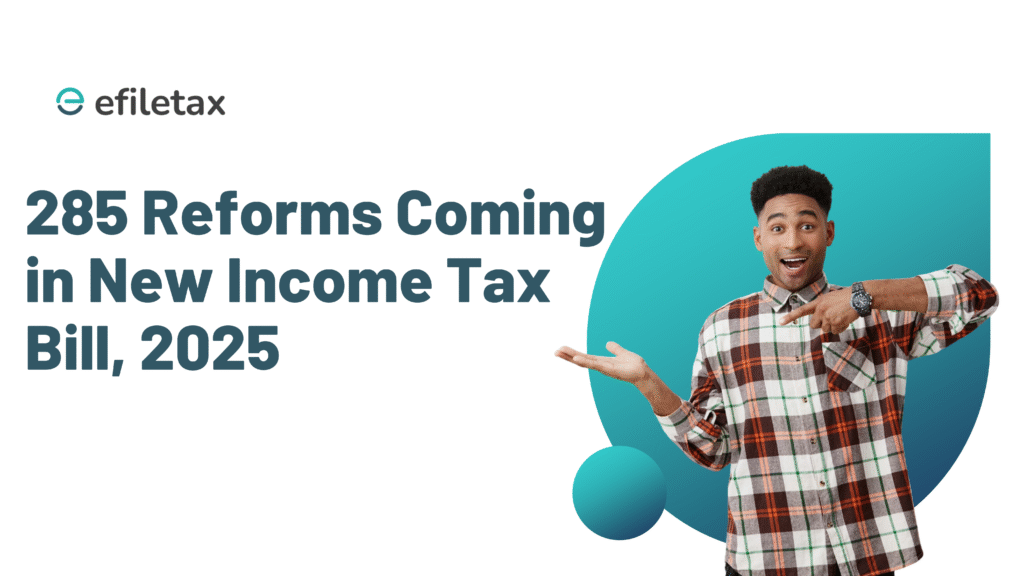
Summary
India’s Income Tax Bill, 2025 proposes 285 changes to modernise the 1961 Act. It aims to simplify tax compliance, reduce litigation, and take effect from April 1, 2026, without altering current tax rates.
Introduction: What is the Income Tax Bill 2025?
The Income Tax Bill 2025 is the government’s ambitious step to replace the 60+ year-old Income Tax Act, 1961. With 285 suggestions from a parliamentary panel, the Bill promises to simplify tax compliance and reduce disputes.
Why India Needs a New Income Tax Law
The existing Income Tax Act, 1961 has:
- Been amended over 65 times
- Accumulated 4,000+ changes
- Led to overlapping provisions and litigation confusion
A 2023 study by the National Institute of Public Finance and Policy (NIPFP) revealed that unresolved tax disputes cost India over $10 billion (₹80,000 crore) annually.
The new Bill aims to fix this mess — not by changing tax slabs, but by simplifying the structure.
Key Highlights of Income Tax Bill 2025
Here’s what the Bill proposes:
1. No change in tax rates or slabs
- Salaried taxpayers and small businesses can breathe easy.
- The Bill retains the existing income tax rates, including those under the new tax regime (Section 115BAC).
2. Time-bound dispute resolution
- Proposes a strict timeline for completing assessments and appeals.
- Inspired by the Vivad Se Vishwas scheme, this could curb long-pending litigation.
3. Clear definitions and fewer ambiguities
- Income types and exemptions will be defined more precisely.
- Redundant sections and overlapping clauses to be removed.
4. Simplified compliance for small taxpayers
- Streamlined return filing, especially for those under presumptive taxation.
- Expected integration with tech-enabled faceless assessments.
5. Rationalisation of exemptions
- Multiple exemptions and deductions are proposed to be consolidated.
- Reduces taxpayer confusion and compliance errors.
Focus Keyphrase in Action: Income Tax Bill 2025
Here’s how the Income Tax Bill 2025 impacts various stakeholders:
| Stakeholder | Impact Summary |
|---|---|
| Salaried employees | No change in tax burden, simpler exemptions |
| CA/Tax professionals | Reduced disputes, easier compliance advice |
| Startups & MSMEs | Less paperwork, time-bound grievance handling |
| Appeals & litigation | Faster case closure, clear timelines |
Legal Basis and Timeline
- Report tabled: July 16, 2025
- Committee head: Baijayant Panda (BJP MP)
- Number of suggestions: 285
- Target implementation: From 1st April 2026
The panel’s report is not yet law — the final version will be tabled in Parliament later in 2025.
🔗 Reference: PIB Press Release on Report Submission – July 2025
Expert View: Practical Tax Tip
“Don’t wait till 2026. Begin reviewing your deductions, exemptions, and how your income is structured. The shift will favour transparent, well-documented tax practices.”
— CA Mahesh Rathi, Tax Litigator, Mumbai
What You Should Do Now
- Track updates: Final Bill may tweak some clauses
- Review exemptions: Deductions you rely on might be streamlined
- Digitise records: Better documentation will help with faster resolution
- Use Efiletax: Stay compliant and informed with expert help
FAQs on Income Tax Bill 2025
Will my tax rate change from April 2026?
No. The Bill proposes no changes to income tax rates or slabs.
Do I need to file taxes differently?
For now, continue with existing ITR forms. Efiling changes may come closer to April 2026.
Is this like a new Direct Tax Code?
Conceptually, yes. But unlike the DTC proposals of the past, this one focuses on simplification, not radical overhaul.
Conclusion: A New Era in Tax Compliance
The Income Tax Bill 2025 is India’s attempt to clean up a heavily amended law without shaking the tax structure. If implemented well, it can cut red tape, reduce litigation, and boost taxpayer confidence. For professionals and taxpayers alike, it’s time to start preparing.